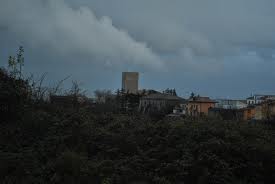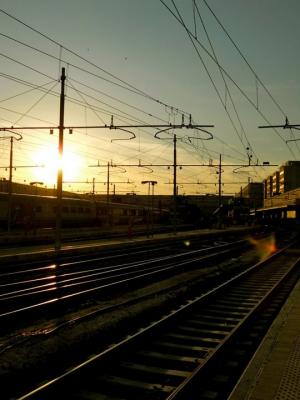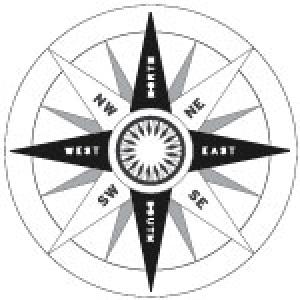It was early September, the air still balmy, the perfect weather for a Venetian escapade. Caterina and Pascal were sitting in a café across a canal divining their future, in a quiet campo off the beaten track, away from the tourists and the film crowd who had invaded the city for the festival. They sipped their frothy iced cappuccinos, basking in the sun, their eyes fixed on its refractions dotting the greenish canal with specks of glitter. They felt that for once things were beginning to look promising for both of them.
All posts tagged: Italy
Mezzogiorno

There was a pile of old vines and twigs in the vineyard. We lit a bonfire and the flames licked daylight into the night sky. Next morning there was a gray and black patch of coldashes, perfectly round. It looked hard, like crushed marbles, so I stepped on it. My boot sank deep into tiny feathers. A gray boot and a brow none told me I should have known better.
Brother, Three Steps from Cipro
By OPHELIA HU

Shick-a-shawing down Linea A, three stops from Cipro, Rome, I overheard a violin poorly played. Now and again, I curse my perfect pitch. A quarter tone drawled between D and D#, pulled headlong from a heavy-held bow like a dead rabbit from a hat. It was a nuisance. But I looked over to behold a blue-eyed boy crowned with thick brown hair and matching freckles.
From the Stone House: On Belonging
As the crow flies, Montereggio is perhaps a dozen kilometers from Castiglione del Terziere, my Italian home for a year. But Lunigiana—this northern part of Tuscany, between the Emilian plain and the Mediterranean Sea—is so hilly that I never know how many dizzying switchbacks a road might boast, thus how long it’ll take to get from A to B. (Or how many times en route our car will have to edge past another coming at it. Sometimes both vehicles must fold in their side-mirrors like wings so as to squeeze by.)
Omnipresence: A Poetry and Imagine Installation in Castiglione del Terziere, Italy
Poems by LORIS JACOPO BOLLINI and art by ANDREA POGGIPOLLINI, with an introduction by MARTHA COOLEY
Andrea Poggipollini is a Bologna-based artist who works in multiple media. His summer-long installation “Omnipresence” in the medieval borgo (walled village) of Castiglione del Terziere in Lunigiana, Tuscany, featured sculpture, photography, video, and excerpts from poems by Loris Jacopo Bononi. Bononi, an Italian writer (earlier in his career, a doctor), writes poetry and prose; his work has been lauded by Pier Paolo Pasolini, among others. He is the author of Trilogia (Diario postumo, Miserere dei, and Il poeta muore), Libri e Destini, and other texts.
Viewers walked through the borgo to encounter Poggipollini’s and Bononi’s collaboration in unexpected places: on placards on walls high and low, windows, on the ground, and in cellars. Among the installation’s elements were life-sized sculptures of human figures in black or white—kneeling, standing, sitting—which materialized as unexpectedly as phantoms on stone walls, in a bell-tower, and on the balcony of the village’s once-grandest house, now abandoned. In a passageway between two buildings were photographs by Poggipollini of sculptures he’d previously made, to which Bononi’s poetry-excerpts are an implicit response.
The photographs of Poggipollini’s work are echoes of echoes of echoes, one might say.
The Poet in Rome: Richard Wilbur in Postwar Italy
By ROBERT BAGG
I.
Richard Wilbur first visited Rome with the American Fifth
Army that liberated the city, just behind the fleeing Germans, on 5 June 1944.
By 10:00 p.m., his division, the 36th Texans, in trucks, in jeeps, and on mobile artillery, followed the tanks of the First Armored Division into the southern outskirts of Rome, where it paused, expecting to camp and rest within Cinecittà—then, as now, the sprawling center of Italy’s movie industry. Ever the explorer, Wilbur wandered into an abandoned viewing room and found, already loaded into an editing machine, a costume drama set in the Roman Empire. He turned the hand crank and watched a Fascist version of ancient history until his disgust overcame his curiosity. Around midnight, the 36th received an order to cross the city, mount the Gianicolo (Rome’s westernmost hill), and be ready to chase the Germans into Tuscany. But Wilbur’s signal company interpreted the order loosely, slept in, and didn’t cross Rome until the next day, setting up their Message Center inside the Vatican gardens.
Buone Vacanze

Dispatches will be taking a vacation during the month of August. In the meantime, please take a virtual vacation with some of our recent dispatches: Join Julia Lichtblau as she contemplates economics in sun-soaked Lisbon; Maura Candela as she stumbles upon her husband’s roots in Sicily; James Gill as he recalls a paradise lost in Canada’s Saskatchewan prairies, and Todd Pitock as he gazes up at the cold night sky in one of the hottest places on earth.
Reunion
The dogs were the first to greet us. Two came trotting into the parking lot of the Masseria. A farm manor on a mountaintop, the Masseria was built into the cliff of tufa, the sandstone of the mountains that ring the Valley of the Jato. Like one of Michelangelo’s Captives struggling to be free of marble encasement, the house—with all its many additions—seemed caught in the act of struggling to free itself of the mountain.
Italian Winter
November 15, 1998
Dear Helen,
Coming down to Italy on the train from Belgium, some inspectors entered my cabin and started going through my things. They found a little packet of nutritious grasses, meant to be stirred into a glass of spring water and downed before a marathon. They said, “What is this?” I said, “Grass.” They looked at me strangely, but no Midnight Express ensued. In Florence (little like a flower, much like a hammer), I asked the shapely cappuccino-maker “Che ora tu liberatore?” which means, I found out later, not “What time are you free?” but either 1) nothing, or 2) “What time are you open?” Got a phrase book after two days of smiling and pointing. Now I speak long sentences which mean things that no one understands. Slept in a decaying vineyard first night out of Florence. Put on four pairs of pants, eight shirts, underwear over my ears. Should have brought a sleeping bag but figured I’d have a girlfriend. When I arrived in Siena, I found a field behind a condominium and slept there that night and for the next four nights. Got a bed in the Ostello della gioventu when the rain got serious. The beauty of this place would knock the stuffing out of an olive. A presto.
Love, Jock







